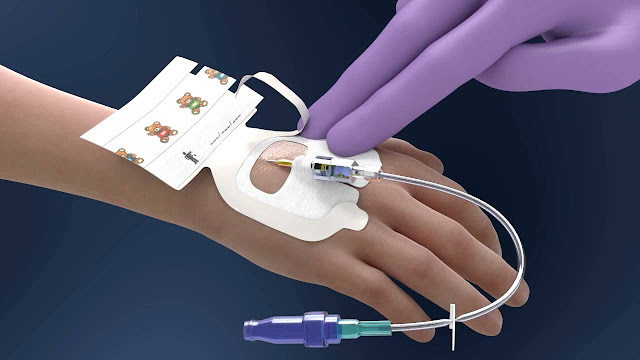 |
| IV Dressing Market |
The IV dressing market is estimated to be valued at US$ 794.7 Mn in 2023 and is expected to exhibit a CAGR of 5.3% over the forecast period 2023-2030, as highlighted in a new report published by Coherent Market Insights.
Market Overview:
IV dressings are sterile adhesive dressings used to secure intravenous access
devices like needles, catheters, or tubes inserted into patients' veins or
arteries for fluid injections, blood transfusions, or to withdraw blood
samples. IV dressings prevent bleeding and infections as well as protect the insertion
site from environmental exposure and contamination. They find wide applications
in hospitals, clinics, long-term care facilities, homecare settings, and
ambulances for treatment of various acute and chronic conditions.
Market Dynamics:
The growth of the global IV dressing market is primarily driven by the rising
healthcare expenditure worldwide and increasing prevalence of chronic diseases
requiring intravenous therapies such as chemotherapy for cancer. As per
estimates by the World Bank, global current health expenditure as a share of
GDP increased from 9.8% in 2000 to 10% in 2017. This has broadened access to
advanced treatment modalities involving IV administration of medications across
various disease indications. Furthermore, rapid growth in the geriatric
population base, which is more susceptible to intravenous procedures for
managing pain, infections and fluid balance, is also fueling demand for IV
dressings. However, availability of alternative wound closure methods and risk
of infections associated with IV insertion sites pose challenges to the market.
SWOT Analysis
Strength:
IV dressing has good antibacterial properties which helps prevent infections.
IV dressings are easy to use and provide reliable protection of intravenous
access sites. They ensure secure fixation of intravenous cannulas and secure
coverage of insertion sites.
Weakness:
IV dressings need to be changed frequently which increases cost of treatment.
Some patients may have allergic reactions to the adhesive materials used in
some IV dressings.
Opportunity:
Rise in number of surgeries worldwide provides scope for increased demand of IV
dressings. Technological advancements allow development of IV dressings with
advanced properties like transparency and moisture resistance.
Threats:
Availability of alternative techniques like midline catheters for medication
administration poses threat to IV dressings demand. Economic slowdowns can
negatively impact the healthcare expenditures and reduce market growth.
Key Takeaways:
The global IV
Dressing market Growth is expected to witness high growth, exhibiting CAGR of 5.3% over the forecast period,
due to increasing number of surgeries, accidents and chronic diseases like
cancer. As per statistics, around 313 million surgeries were performed
worldwide in 2020. This is projected to boost the demand for surgical supplies
including IV dressings.
Regional analysis
North America dominated the global IV dressing market in 2022, accounting for
around 35% of the overall shares, owing to increasing healthcare expenditure
and rising prevalence of chronic diseases in the US and Canada. Asia Pacific is
anticipated to witness fastest growth during the forecast period owing to
improving access to healthcare facilities coupled with high disease burden in
populous countries like China and India.
Key players related content comprises
Key players operating in the IV dressing market are Becton, Dickinson and
Company, Lohmann & Rauscher, Komal Health Care Pvt. Ltd., Paul Hartmann AG,
DeRoyal Industries Inc., Tytex, Shandong Dermcosy Medical Co., Ltd., Smith
& Nephew plc, Dynarex Corporation, Talent Healthcare, 3M and Datt
Mediproducts Pvt. Limited. These players are focused on developing advanced
dressings using new materials to achieve better compatibility and efficacy.
Read More,
https://www.trendingwebwire.com/iv-dressing-market-trends-size-and-share-analysis/



0 Comments